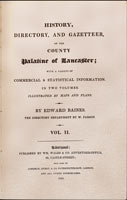
HISTORY, DIRECTORY, & GAZETTEER, of the COUNTY PALATINE of LANCASTER in TWO VOLUMES |
||||
page 442 |
this spring was in so much repute, that the waters, which were supposed to be a sort of universal specific, whether taken internally or applied externally, were taken to a distance, and sold at a high price; but undue popularity of all kinds has generally its season of re-action, and the virtues of the Oldham spa water are now as much under-rated as they were formerly over-valued. Like other water, it will ultimately find its level. Oldham is preparing to compete in the race of public improvements which, at this period, prevails so generally in the manufacturing towns of Lancashire. It is in contemplation, and the surveys for the purpose are already made, to establish, with as little delay as possible, both water works, which have long been wanted, and coal gas works, which will greatly improve the appearance of the town by night, and for the generation of which luminous vapour the raw material is so near at hand. A police act, with powers for erecting a town-hall and public offices, is also prepared for the next session of parliament. This is the more necessary, as Oldham has become a principal connecting link between the two first counties in the north of England - York and Lancaster, and the number of carriages and travellers passing through the town, both by night and by day, is already very large, and daily increasing. There is no regular market-day here, but Saturday is observed as a kind of vegetable and flesh market. There are three annual fairs for cattle, horses, sheep, and pedlery, two of them stationary, and the third moveable; the fixed fairs are on the 2d of May, and the 8th of July, and the moveable fair is on the first Wednesday after the 12th of October. Soon after the memorable 16th of August, in the year 1819, the attention of all England was directed to a judicial inquiry which took place in this town, arising out of the death of one John Lees, a cotton spinner, and which proceeding was called emphatically the Oldham Inquest. The deceased, while in attendance at the Manchester reform meeting, over which Mr. Hunt presided, had received several bruises in different parts of his body, and a sabre wound upon his arm; to these injuries he had not paid proper attention, in consequence of which a mortiiication ensued, and he died on the 7th of the following month. To ascertain the cause of his death, an inquest was summoned, by the clerk of the coroner for the district, the principal being at that time from home on his professional duty, at the assizes at Lancaster. After an investigation continued by adjournments, partly in the presenceof the coroner, and partly in that of his deputy, for several weeks, and conducted in the spirit of those unhappy times, the whole proceeding was rendered nugatory by a decision of the Court of King's Bench, which determined that the inquest was illegal, because it was not originally held by the coroner, but by his deputy; and, though the coroner had caused the body to be disinterred that it might be viewed by him in the presence of the jury, yet, as he had not re-sworn the jury, after the inspection, the defect of the original holding was not remedied. Under these circumstances the jury was dismissed without being called upon for their anxiously expected verdict. The Chapelry of ROYTON extends to the north of Oldham, and though the least of the three dependant townships, it contains a population of upwards of 5000 inhabitants. The village is situated in a deep
|
|||
